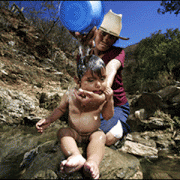The Stream, February 9: Drought in China
China barely gets mentioned in world food reports despite being the biggest grain producer, but on Tuesday the United Nation’s food agency issued a special alert, warning that a dire winter drought is now threatening China’s wheat crops. And the world’s food security, The New York Time explains.
Meanwhile, intense monsoon rains have destroyed at least 35 percent of Sri Lanka’s rice crops, but the impact on the world rice market will be minimal, Reuters reports.
Acid water from Johannesburg’s derelict underlying mines is rising up so fast that it threatens to seep into the city, foul up infrastructure and endanger the health of millions within the next few months, a new report warns. Once the staple of Johannesburg’s growth, the gold mines are now a dangerous cocktail of sulfuric acid, heavy metals, toxins and radiation.
Johannesburg surely needs a clean-up, but Hungary is also struggling to wipe out the toxic red sludge that flooded parts of the country last year. According to Greenpeace, waste water from the aluminum plant is still polluting the area.
The United Arab Emirates should cut down on agriculture to save their scarce surface and ground water reserves, according to a senior safety official. Despite heavy investment in desalination plants and farms across the globe, the country’s fresh water reserves might run out in the next 50 years, Reuters reports.
The Stream is a daily digest spotting global water trends. To get more water news, follow Circle of Blue on Twitter and sign up for our newsletter.
, a Bulgaria native, is a Chicago-based reporter for Circle of Blue. She co-writes The Stream, a daily digest of international water news trends.
Interests: Europe, China, Environmental Policy, International Security.



Leave a Reply
Want to join the discussion?Feel free to contribute!